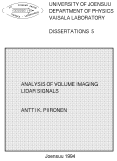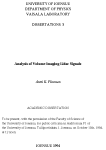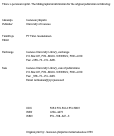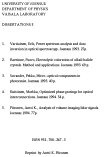 speed and
0.4--1
speed and
0.4--1 direction root-mean-square errors are estimated for
hourly averaged measurements.
direction root-mean-square errors are estimated for
hourly averaged measurements.




Antti K. Piironen
August 1, 1994
Antti Piironen University of Wisconsin--Madison Space Science and Engineering Center 1225 West Dayton Street Madison, WI 53706, USA
Keywords: area averaged measurements, convective boundary layer, cloud base, cloud coverage, cloud top, lidar, signal analysis, wind profile




Abstract
This thesis presents a study of signal analysis methods for measuring convective boundary layer mean depths, cloud base altitudes, cloud top altitudes, cloud coverages, and mean wind profiles in the atmospheric boundary layer from data obtained with a Volume Imaging Lidar (VIL). All VIL data from the 1987 and 1989 First ISLSCP (International Space Land Surface Climatology Project) Field Experiment are analyzed and results summarized. The convective boundary layer mean depths, cloud base altitudes, cloud top altitudes, and cloud coverages are automatically estimated from the backscatter profiles measured with the VIL. The results are compared with estimates visually obtained from Range Height Indicator scans of the VIL. The automatic results agree with these visual estimates. The cloud mapping capability of the VIL is also demonstrated.
Refinements are done to a correlation technique, which calculates
vertical profiles of horizontally averaged mean winds
from the aerosol structure motions
between subsequent horizontal aerosol distribution maps
measured with the VIL.
An objective technique to identify unreliable measurements is developed.
An error analysis based on determining the errors due to
random noise in data is performed.
The VIL wind profiles are compared with
radiosonde, aircraft-based, and ground-based measurements.
Based on internal consistency of the VIL wind estimates
which have passed the reliability analysis,
a 0.03--0.1 ms speed and
0.4--1
speed and
0.4--1 direction root-mean-square errors are estimated for
hourly averaged measurements.
direction root-mean-square errors are estimated for
hourly averaged measurements.